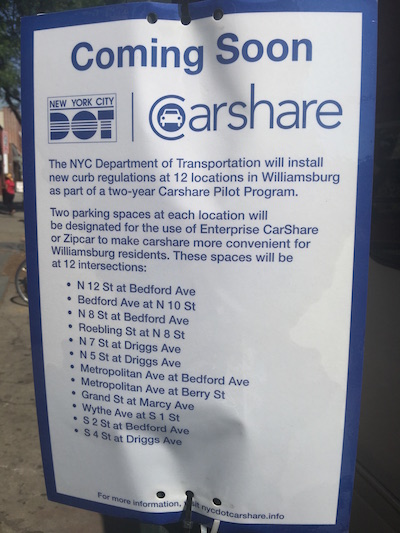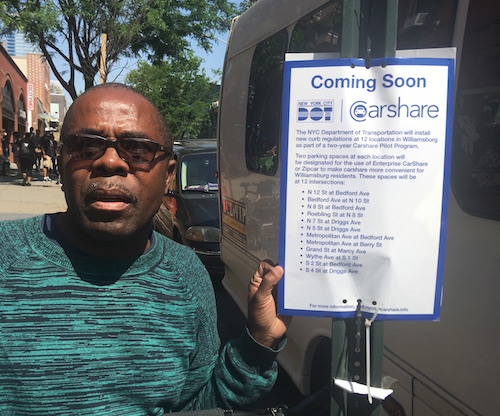Commuter van (aka dollar van) drivers are alleging the de Blasio administration is stonewalling them while strategically giving a sweetheart deal to two national car share companies as a transportation alternative once the L train shuts down for repairs next April.
Leroy Morrison, vice president of the Commuter Van Association of New York, said he was shocked to see recent notices at some of his Williamsburg pick-up stops that they would now be reserved for Enterprise CarShare and Zipcars.
The parking spaces are part of a new de Blasio pilot program plan rolled out earlier this month, in which the car-share companies will take over 230 street parking (300 parking spaces total including municipal parking and public housing parking) throughout the city. Williamsburg will get the lion’s share or 26 of these spots.
 The de Blasio Administration says the program will help the environment, give residents of transit-starved neighborhoods another way to get around, and reduce the number of cars on city streets.
The de Blasio Administration says the program will help the environment, give residents of transit-starved neighborhoods another way to get around, and reduce the number of cars on city streets.
But Morrison says the carshares were put in Williamsburg as an alternative method to get around the upcoming L train shutdown, while the commuter van industry has been trying for over two years to get authorization from the city to increase their routes in the area as an alternative to the shuttered L train.
“We’ve been trying to get those same spots for two years and they give it to national companies while they put the little guys out of business,” said Morrison. “They say there is too much congestion, but commuter vans are less congestion than carshares”
A DOT spokesperson said the carshare parking pilot “coming soon” sign referenced is not related to for-hire vehicles or commuter vans at all, and does not represent a “stop,” but rather a location where carshare vehicles will be available for rental during the pilot.
Making carshare more convenient for New Yorkers has the potential to reduce congestion and personal car ownership, as well as free up more parking spaces at the curb, said the spokesperson.
The spokesperson acknowledged that the DOT has heard from van operators to best understand how their services can be coordinated with the broader L Train Tunnel reconstruction mitigation planning. It is important to note any effort to incorporate licensed commuter van service into the mitigation plan must acknowledge the expanded level of MTA bus service that will be required along 14th Street, as well as in the Williamsburg area and across the Williamsburg Bridge during the reconstruction phase, the spokesperson said.
The spokesperson noted that ordinances state no commuter van service shall solicit, pick up or discharge passengers, or permit or authorize the solicitation, pick up or discharge of passengers along a MTA route.
But Morrison maintains the DOT has yet to authorize any kind of commuter van service once the L train shuts down. The DOT continues to stonewall the commuter van industry, which has been trying for over two years for some type of authorization, he said.
Mossison also said where the authorization the commuter drivers have applied for is not on throughfares where there are bus routes – both in Williamsburg and lower Manhattan. He also insisted the throughfares they applied for are exactly where the carshare spostes were given.
The city in the past has worked with dollar van owners in emergency situations. This includes the aftermath of 9/11, the 2005 transit strike and when some bus lines were taken out of commission.
“We’ve been operating for over 30 years in Queens and Brooklyn, and now they push us to the curb and treat us like underdogs,” said Morrison.
“They give parking spaces to their big donors with deep pockets while they push us to the curb. We’ve had applications in for a couple of years and have had no response. But now they are giving these guys carshare stops,” he added.










